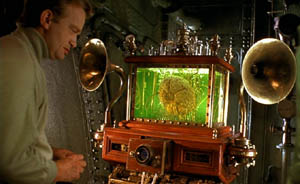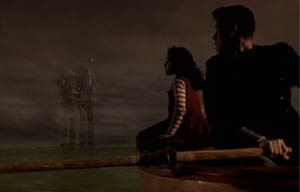|
Rarely does a film manage to achieve this much pure mood. It's nigh on to impossible to watch without feeling a deep sense of nostalgia, even if, as is probably the case, you've never seen it before.  Watching this movie seems less like simply watching a movie and more like re-experiencing a half-remembered dream you had in your single digits that you are suddenly shocked to find out was in fact a real film and not a dream at all. Part of this may have much to do with the fact that this is the only film I can ever recall seeing wherein every scene takes place at sunset (or sunrise; who can tell?) All the story elements feel like slightly stranged-up ideas from slightly drugged-out bedtime stories we probably never heard but feel like we should have, to boot. This joint directorial effort from French directors Jean-Pierre Jeunet and Marc Caro features a slightly slow circus strongman, a nine-year-old thief (played by Judith Vittet, who has more screen presence than most actresses twice her age,) an evil pair of siamese twins who rule the grade school-aged thieves (shades of Oliver Twist, although Fagin was never so sinister,) a brain in a tank, a gaggle of clones (all played by Dominique Pinon,) a cult of one-eyed "sight renouncers," and a cantankerous old man who never dreams, and kidnaps children to steal theirs and thus keep his sanity. Oh, and lets not forget the trained assassin fleas. No, that was not a series of fascinating typos. Fleas. Controlled by an organ grinder. One may have surmised at this point that this is not a typical film, though I reject the general notion that it is confusing and hard to follow. It doesn't hit you over the head with the story, nor is there much in the way of exposition, but it does show you the story. If you're waiting for the "Scooby-Doo" scene wherein the characters explain the whole shebang for the audience's benefit, you aren't going to get it, so pay attention. This is a film, not a book. It's a visual medium, and the answers come visually. The visuals are, while I'm on the subject, absolutely gorgeous. The screen is awash in a perpetally sunset-colored glow of golden light on retro-industrial, fantasy-European settings, with ultra high-tech devices brought to functionality through complex clockwork designs instead of computer technology, as if the whole film existed in a nineteenth-century writer's speculation of the future. Cinematography is excellent (sunsets make for great shadows,) and the special effects, from miniatures to CG, continue to show us things we've actually never seen before-witness how one teardrop causes a shipwreck for one such example-and isn't that why we go to the movies to begin with? 
Of course not. For the most part we go to movies to see endless rehashes of the same old thing, which is at least in part why the subsequent Jean-Pierre Jeunet film Amelie garnered much greater acclaim; while a terrific film in its own right, Amelie at least fell within the more comfortable "love story" genre. The City of Lost Children falls instead within the part fairy tale, part Charles Dickens on shrooms, part Terry Gilliam genre, which is harder to market and tends to acquire fewer rave reviews. But there's more ideas in this flick than in twenty or more Jennifer Lopez romantic comedies, and fewer tired tropes than five minutes of one of them. If you have an imagination, see it. If you never had an imagination and want to know what one looks like, also see it. If you're Jennifer Lopez, take better scripts and quit singing that godawful crap. -review by Matt Murray
|
|
||||||||